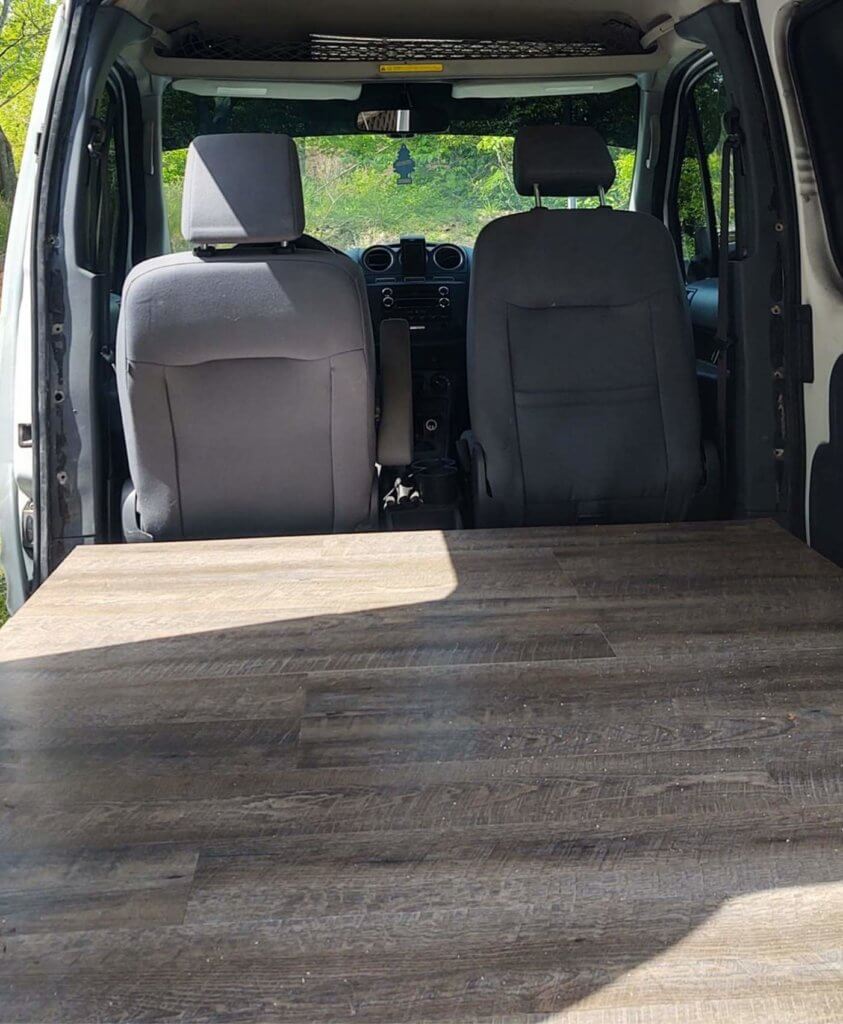
Congratulations, you just bought your first van for a camper van conversion!! I’m sure by now you have looked at tons of different ways you can convert your new van, including which type of camper van flooring to use.
I remember being so confused about where we should start with our build, and I am happy we started with the floor. Our camper van is exceptionally soundproof, which is excellent if you are a light sleeper like me. Our floor installation perfectly keeps in cold or hot air, depending on the season.
One thing you must consider is the camper van flooring material. There are several types of materials you can use to make your flooring feel homey, keep in the heat, and hold up your furniture and slat bed.
You may not think a subfloor is necessary; some even leave it out. I recommend installing one because subflooring helps level out your living space and reduces noise.
Consider This Before Purchasing Camper Van Flooring
Before installing your camper van flooring, you need to consider a few things to create your ideal environment.
Durability
When installing your camper van flooring durability is crucial to the rest of your van build. You, all of your furniture, and belongings will be sitting on your floor.
Because your flooring holds all of your living items you need to create a strong base (subfloor). Don’t worry I will go over a step-by-step installation in another post.
Weight/ thickness
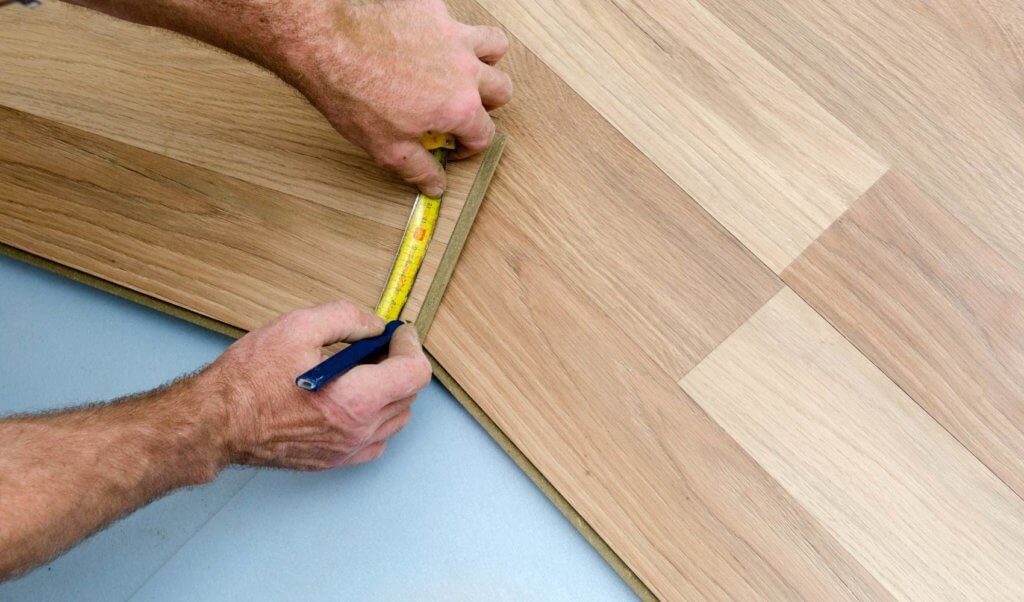
Flooring and subflooring can be heavy especially if you use plywood, which most do. Sometimes using thin plywood will help cut down the weight quite a bit.
Purchase thin flooring materials; that way, it doesn’t compromise space.
How it feels
Feel comes down to your personal preference. If you have a small camper van like our Ford Transit Connect, the feel of your flooring might not be important to you.
If you have a big van, feel is everything. When your feet hit the floor on a cold morning, you will want a solid foundation, so your floors aren’t shockingly cold.
Price

You don’t need to spend a fortune on your camper van flooring materials. There are great options that are still affordable.
Look around the house or ask friends and family if they have anything you need. You will be surprised at what you will find at a cheap price.
We spent less than $500 on our van build because we found a lot of supplies that were only halfway used around the house.
Looks
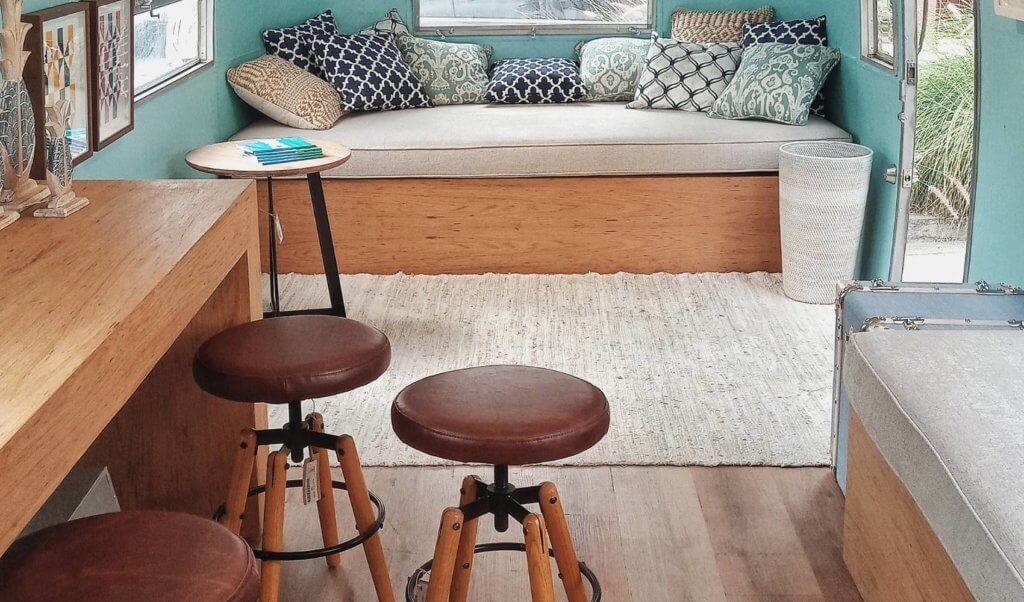
Camper van flooring can pull everything together in some cases. Most camper van floors are covered with beds, furniture, and storage.
Sometimes, like in our case, you won’t see the floor. However, if you are worried about looks, try for a dark textured look. We live in a camper with white floors, and EVERY spec of dirt shows! Dark flooring materials will help hide dirt.
Materials Used For Camper Van Flooring
You can use cork, various vinyl styles, marmoleum, hardwood, rubber, linoleum, or laminate as materials for your camper van flooring.
Here is a chart to give you a quick look at some of the more important aspects of the camper van flooring materials I listed above.
| Material | Water Proof? | Easy Install? | R-value | Is it Toxic? | Cost Per Square Foot |
|---|---|---|---|---|---|
| Cork | Yes | No | 1.13 | No | $4-$8 |
| Linoleum | Water-resistant | no | .4 | Can be | $3-$11 |
| Luxury Vinyl Plank | Yes | Yes | .2 | At first install | $2-$5 |
| Peel and stick Vinyl | Yes | Yes | 0.05 to 0.17 | Yes | $1-$2 |
| Sheet Vinyl | Yes | Yes | 0.05 to 0.17 | Yes | $1-$3 |
| Rubber | Yes | Yes | 1.1 | No | $3-$15 |
| Marmoleum | Water-resistant | No | .4 | No | $3-$7 |
| Hardwood | No | No | 0.63 to 0.97 | No | $3-$10 |
| Laminate | No | No | .3 | Yes | $2-$11 |
1. Cork
Cork flooring for camper vans is one of the most expensive and hard-to-install materials. You will need to seal the planks and reseal them every few years.
Even though there are some negatives to using this material, there are some positives. Cork is extremely resistant to moisture and perfect for resisting mold and mildew. This material also has one of the highest R-values at 1.13.
This flooring material is perfect for those living in a van full-time because of its longevity and durability. You can install tiles that click in place (typically thick) or glue down tiles (these come in thin sheets).
Cork flooring is the most environmentally friendly option of all the materials, its only competitor being linoleum.
Pros
- Durable
- Environmentally friendly
- Fire-resistant
- Hypoallergenic
- Water and mold-proof
- Insulates well
- High R-value
Cons
- Pricey
- Hard to install
2. Linoleum
Linoleum is similar to cork in that it’s a “green” material, anti-mold, fire-resistant, and durable.
There are, however, a few differences. Linoleum is a bit cheaper and needs to be waxed twice a year. This material only has an R-value of .4, so it doesn’t compare to the cork’s insulating factors.
Pros
- Durable
- Environmentally friendly
- Fire-resistant
- Hypoallergenic
- Water and mold-resistant
Cons
- Needs constant upkeep
Vinyl
You can install several types of vinyl flooring, each of which has its advantages and disadvantages.
Luxury Vinyl Plank (LVP), peel and stick, or sheet exist.
3. Luxury Vinyl Plank (LVP)


LVP seems to be the most popular option for camper van flooring materials, and for a good reason. These vinyl planks are durable, easy to remove, block out moisture, and look incredible.
The life span of LVP is anywhere from 10-20 years. It is designed for spaces in your house that receive the most attention, like your kitchen or bathrooms.
Because they are meant for high-traffic areas, LVP is waterproof, making the material great protection against mold on your camper van floor.
To install, you only need to click them into place on the ground (like tongue and grove)—no need for messy glue or adhesive. You can easily take out the flooring if a plank needs replacing.
One thing to remember is the “wear layer” of LVP planks. This layer provides the plank with protection. The thicker the coating, the better your floors will be protected, and the more expensive it will be.
Pros
- Several different styles and colors
- Durable
- Moisture resistant
- Widely available
Cons
- Pricey, depending on the thickness of your “wear layer”
- Not quite as “green” as other options. It is made of non-recycled materials
- Hard on the feet, not the softest option
4. Peel and stick Vinyl


Peel and stick vinyl is similar to the LVP planks, as mentioned above, except for the adhesive side used to stick on the floor.
We decided to go with peel and stick, mainly because that’s what was left over from our bathroom remodel in our house. I love a few other things about this type of camper van flooring.
I love how easy it is to install the planks, and how flexible they are. They are easy to cut into the shape you want them.
This material is one of the cheapest options for your camper van flooring, but that doesn’t mean it’s the most durable.
The average life span is 5 to 25 years, but that’s for a house. It won’t be long before you notice your planks unsticking from the floorboard of your camper van. Good thing you can replace one plank at a time.
Pros
- Cheapest camper van flooring option
- Easy to install
- Waterproof, perfect for humid environments
- Thousands of different styles and options on the market
Cons
- All vinyl has toxic chemicals
- Not environmentally friendly
- Not as durable as other flooring options
5. Sheet Vinyl
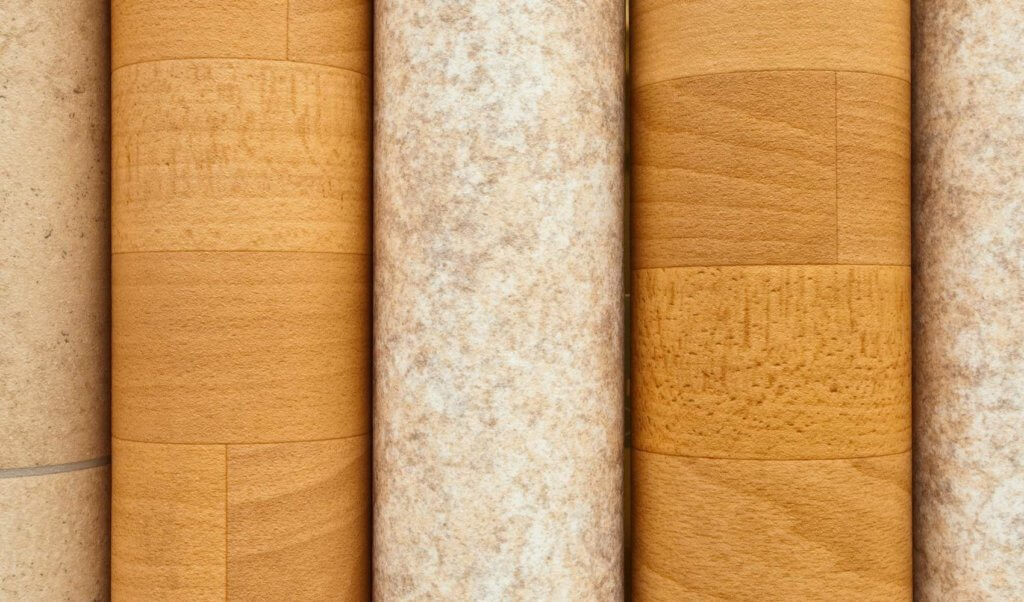
Sheet vinyl comes in a huge role as one inexpensive piece. You will need to cut it according to the shape of your camper van floor.
Gluing is the next step to installing sheet vinyl. I would recommend an Acrylic-based adhesive. This type of adhesive is not influenced by fluctuation in weather changes, making it perfect for keeping that sheet vinyl in place.
Sheet vinyl provides the most waterproof option because there are no cracks or crevices for moisture to sneak into. However, because it is one big sheet, you will have to replace the entire floor if one area becomes damaged.
A huge downside for me is the toxic VOC chemicals released when installed. Fortunately, these chemicals will go away after a short time after installation.
Pros
- Easy installation
- Inexpensive
- Waterproof
- Comfortable
Cons
- Easy to damage
- If it does get damaged you will have to replace your entire floor
- Toxic VOC chemicals are released after installation.
6. Rubber


Rubber flooring is one of the more durable options for your camper van. This type of flooring is typically seen in camper vans owned by extreme sports enthusiasts.
Those that go biking, surfing, or kayaking may opt for rubber flooring because of how durable and waterproof it is.
Think of those campers and RVs that you have seen at shows. Some of them have toy haulers in the back. This portion of the camper has rubber flooring.
Unfortunately, this type of flooring isn’t aesthetically pleasing; it’s pretty heavy and creates an unpleasant smell.
If anything, Install rubber flooring in the “garage” portion of your camper van where items like bikes will be stored.
Pros
- Extremely durable
- Completely waterproof
- Used for heavy-duty storage
Cons
- Extremely heavy
- Smells bad
- No aesthetics
7. Marmoleum
If you want a natural material for your camper van floors, Marmoleum may be a good option.
If you are a full-time camper van traveler, go with a different flooring than this. This type of flooring is not waterproof, just water-resistant. If you experience spills, wipe them up immediately.
Installation involves placing an adhesive underneath the flooring.
Marmoleum can last between 25 and 40 years with proper care.
Pros
- Environmentally friendly
- Lasts for a while
Cons
- Not completely waterproof
- Adhesive is required for installation
8. Hardwood
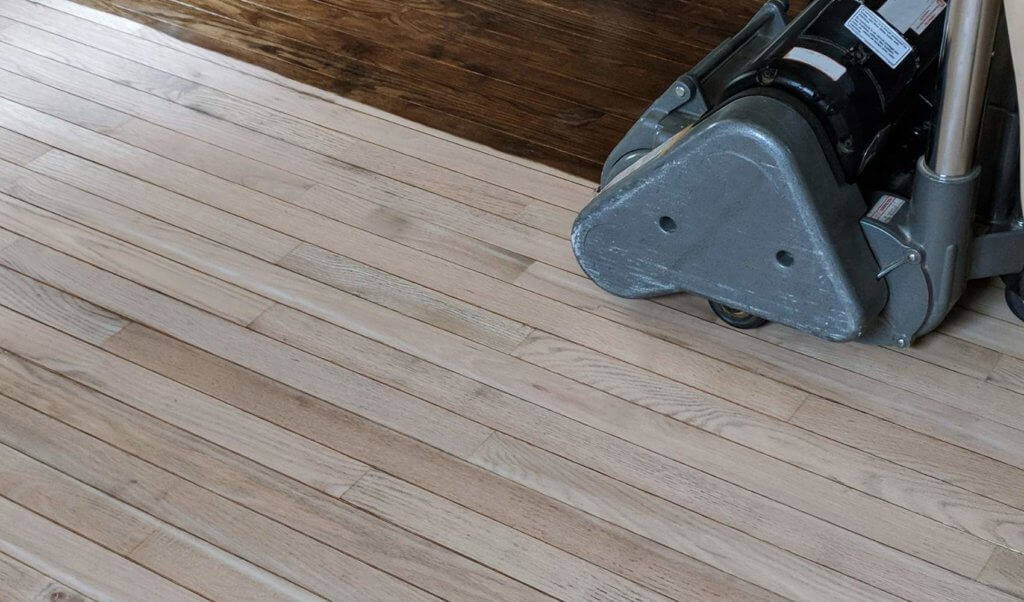
There’s nothing more beautiful than walking into your tiny living quarters and seeing beautiful hardwood flooring. This option is one of the most aesthetic camper van flooring materials; however, I would not recommend it for van life.
Hardwood flooring doesn’t do well with moisture as it tends to absorb it. Its moisture-absorbant characteristic may leave your flooring warped.
Hardwood camper van flooring is easily scratched. This floor would be the worst option for those hauling outdoor equipment.
Pros
- Looks fantastic
- Warm to the touch, great for cold seasons
Cons
- Not water-proof
- Warp easily
- Scratch easily
- Adds more height than any other flooring option
- Hard installation
- Expensive
9. Laminate
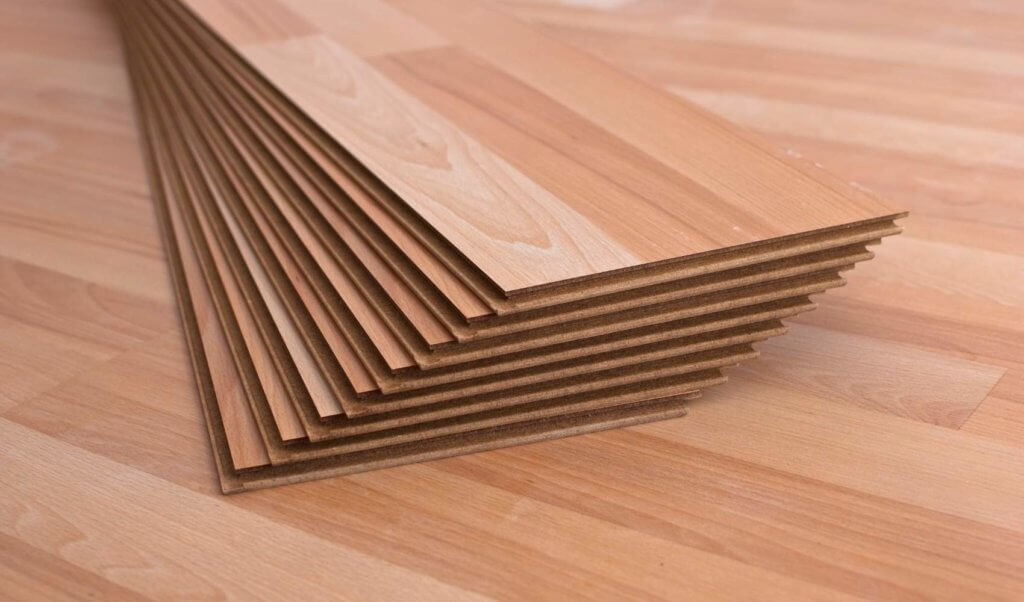
Laminate is a common material used in camper vans. It’s durable, cheap, and comes in various color options.
The big downside for me is water absorption. Laminate absorbs humidity and moisture, not making it a great option for mold-resistant flooring.
There are some options on the market being developed that are moisture-resistant. However, these options tend to be more expensive.
Pros
- Durable
- Cost-effective
- Easy to find in several different options
Cons
- Absorbs moisture, not good for humid environments
- Can be hard to install
Frequently Asked Questions
Here are a few questions people tend to have about camper van flooring.
Do I need Subflooring Under My Camper Van Flooring?
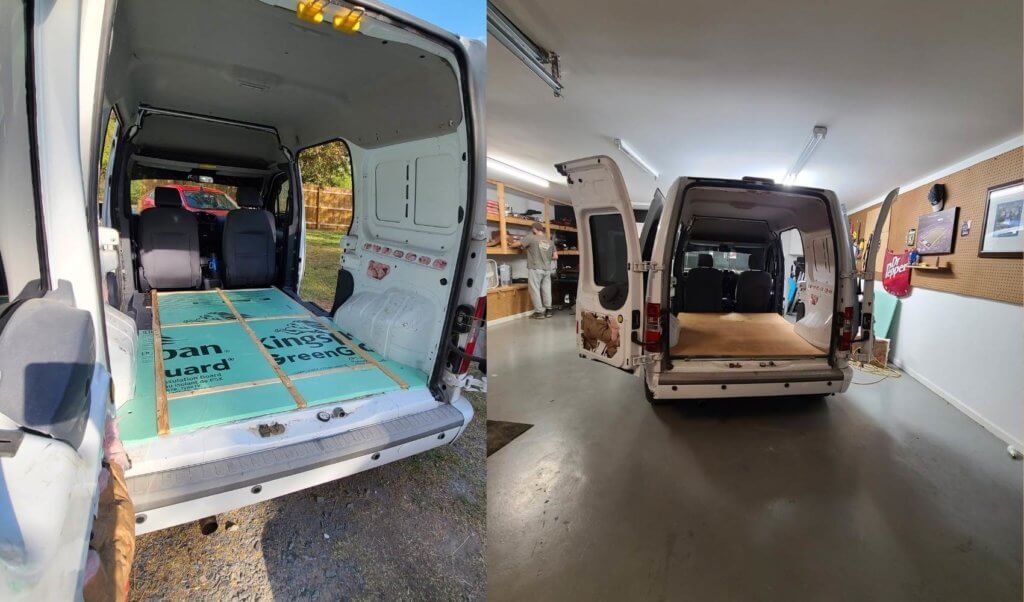
Yes! I absolutely recommend installing a subfloor before installing camper van flooring material.
If you don’t have a subfloor you will not have a way to level out or insulate your floor.
Should I use carpet for camper van flooring?
You can use carpet in a camper van, but I wouldn’t recommend it. If you travel in a camper van or live in one, you are probably out hiking and doing adventurous activities.
You are bound to get your carpet dirty, which can be hard to clean. Also, consider carpet absorbs moisture and holds onto it, making it a breading zone for mold and bacteria.
How much does it cost to install Camper Van Flooring?
The cost depends on several factors:
- Flooring material
- How big your campervan is, and the space you want covered
- Where you purchase the flooring material
To cut down on costs, you can do a few things. Look into a cheaper, durable, water-resistant, or waterproof material such as vinyl.
Look at places like Facebook marketplace or craigslist for your camper van flooring material. Someone may have leftovers from a house project.
We found flooring in Lowes that was half ruined on the top of the box, and we asked for a discount. They gave us a great discount, and we just used the bottom pieces of flooring in the box.
What is a floating floor?
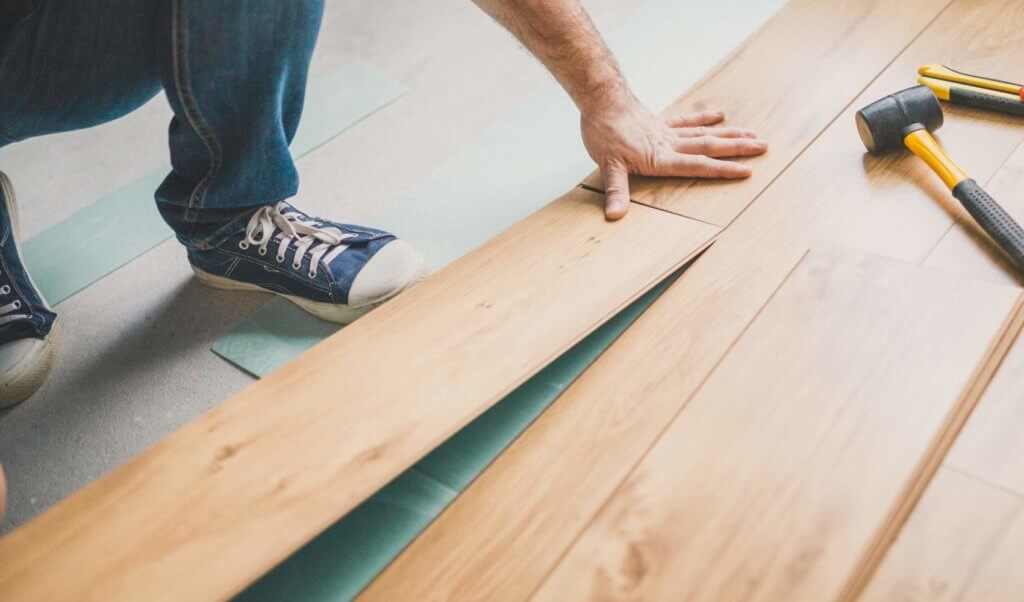
A floating floor is when you don’t use nails or adhesive to install the material. These materials are installed by clicking in place or look like tongue and groove.
Do I need padding underneath my Camper Van flooring material?
Padding is that spongy-looking material that you roll out and cut to install under your top layer of flooring.
Because you will need to install a subfloor underneath your flooring material padding is not necessary.
You can place padding underneath your flooring if you desire. Padding will help with insulating factors and noise reduction.
However, it could cause moisture and mold issues if installed incorrectly. Also, another layer of flooring will take away from precious headspace in your camper van.


Great post! Choosing the right flooring material for a camper van is important for both functionality and aesthetics. Some great camper van flooring materials include vinyl, laminate, and hardwood. Vinyl is a popular option because it’s affordable, easy to clean, and waterproof. Laminate flooring is also a durable and affordable option, and it comes in a wide range of colors and styles to match any design preference. Hardwood flooring adds a touch of elegance to a camper van, but it’s important to choose a hardwood that can withstand the rigors of traveling and camping. Ultimately, the choice of camper van flooring material depends on personal style, budget, and specific needs for the space.
Very informative! Love the pros and cons provided. We have rubber, and it’s perfect for camping with pets. You don’t feel guilty when the floor gets dirty during a trip!
Oh nice rubber is a fantastic option when you have furbabies